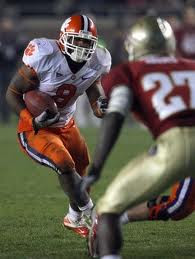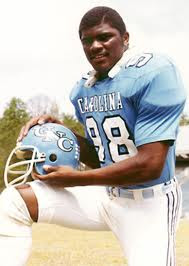
It's probably too late to make this happen, but here's a suggestion:
For Saturday's game at Death Valley, erect a makeshift scoreboard that documents rushing yards.
Running the ball is important in every game unless your name is Mike Leach, but it's critically important in the rivalry between Clemson and South Carolina.
The good folks in Clemson's sports information office supply us media hacks with a media guide supplement -- read: the stuff that was weeded out of the main guide when the NCAA decided to crack down on the size of these glorified recruiting brochures -- and this year that supplement contains game-by-game statistics dating back to the 1980 season.
I couldn't find anything better to do at 6:30 on a Wednesday morning than look up the rushing statistics in the last 30 years of this rivalry, and the overall numbers tend to stand out.
Since 1980, when the Gamecocks out-rushed the Tigers 221-149 in a 27-6 Clemson victory in Death Valley -- yes, the "orange britches" game -- the team that has produced the higher rushing total has won this game 26 times in 29 years.
The only exceptions:
-- 1986, when the teams battled to a 21-21 tie in Death Valley (Clemson out-rushed Run 'N' Shoot-based South Carolina 237-43).
-- 1992, when the Gamecocks won 24-13 in Death Valley despite getting out-rushed 231-128.
-- 2002, when Clemson won 27-20 while getting narrowly out-rushed 150-145.
Twenty-six wins in 29 games. The only stat that's more predictable is your mail coming six days a week.
Of course, Clemson has won 20 of those 26 games. So usually, it's been the Tigers who have been using a dominant running game to victories in this rivalry.
The most pronounced dominance came from 1988-91, a four-season stretch during which Clemson out-rushed South Carolina by an aggregate 1,094-335.
That's an average of 273-83 per game. Not exactly a coincidence, then, that the Tigers won those games by a combined score of 139-49.
Of late, Steve Spurrier probably knows the importance of running the ball in this game. In his three losses to Clemson, the Gamecocks have rushed for an average of 113 yards. In his victories in 2005 and 2009, his team has rushed for 208 and 223 yards, respectively.
The big questions I've been trying to get my mind around this week is: Can Clemson run it?
They didn't do it last year in Columbia, and 48 rushing yards were a bigger contributor to the loss than the three turnovers.
So far this season, the Tigers have played three teams that currently rank in the Top 20 in rushing.
Auburn is 11th nationally, giving up 111 yards a game on the ground. Clemson rushed for 187 yards on those Tigers, albeit with Andre Ellington.
Boston College ranks second nationally at 79.1 yards per game. Clemson rushed for 86 in that game, the same game in which Ellington suffered the injury that has kept him on the shelf since.
Florida State ranks 17th nationally at 115 yards per game. Clemson rushed for 152 yards in that game, with Jamie Harper accounting for 143 of those yards on 27 carries.
The Gamecocks rank seventh nationally in rush defense, giving up 96 yards a game on the ground. You could make the case that opponents have simply chosen to throw the ball against South Carolina's porous secondary, but the rushing numbers are nonetheless impressive.
In the Gamecocks' three biggest wins of the season, dominant run defense has played a major role.
Alabama is averaging 185 rushing yards a game, but the Crimson Tide mustered 36 on 29 carries in a 35-21 beatdown in Columbia.
Florida is averaging 161 yards a game on the ground, but the Gators totaled 35 yards two weeks ago in The Swamp.
Georgia is running at a 147-yard clip, , but the Bulldogs produced 61 rushing yards in Columbia.
All told, that's 132 yards on 75 carries for an average of 1.76 yards per carry.
Clemson's offensive line played its best game in years a couple of weeks ago at Florida State. The big boys up front are going to have to replicate that effort Saturday night, and maybe even surpass it.
On to some Wednesday linkage...
Gene Sapakoff chronicles the relative love fest that's taking place between the teams at Clemson and South Carolina (relative to the nastiness that unfolded in the 2004 game).
"I think we have a really good, healthy rivalry with Clemson now," Gamecocks head coach Steve Spurrier said Tuesday. "I know it was ugly about six years ago, that game in Death Valley got real ugly and was really a terrible scene for our state of South Carolina. I don't sense in any way that could happen with the coaching staffs that are in place now, and the players that are in place.
"I think it will be a good, hard-fought game. I don't think there will be a lot of trash talk. I don't think there will be late hits. A good, clean, hard-fought game, and that's the way it should be."
Another interesting note:
South Carolina kicker and punter Spencer Lanning's sister, Allison, works in the Clemson sports information office. Their mother and aunt were Clemson cheerleaders.
Lanning, by the way, wanted to come to Clemson. The Tigers were already set at kicker, though, after signing a Parade All-American named Richard Jackson.
Ouch.
How do you explain Auburn as a four-point underdog this week at Alabama?
You can start here:
The Crimson Tide's only losses this season came in hostile environments at South Carolina and LSU.
AU has played only three road games, but two were close calls. The Tigers won 17-14 at Mississippi State and 37-34 at Kentucky.
Alabama comes into the game with a 20-game home winning streak. So how does the advantage size up in a stadium that was super-sized in the past year to 101,821 seats?
"Who wouldn't want to play a big game at home?" said Julio Jones, the Crimson Tide's star junior receiver. "You have all the fans behind you supporting you."
Then again...
Home-field advantage actually hasn't meant much in the modern Iron Bowl era. Since 1989, in games played at Jordan-Hare Stadium or Bryant-Denny Stadium, the home team has only an 8-7 edge in this series. Since Alabama moved its Iron Bowl home game from Legion Field to Bryant-Denny Stadium in 2000, the visiting team actually has a 6-4 edge.
Dr. Saturday explores a fascinating topic: The rarity of a team with a weak defense (Auburn) making it to the BCS title game.
That's not to paint the Tigers as inept – nobody gets to 11-0 in a major conference dragging a dead whale behind them. But the kind of defenses that usually show up with the national championship on the line tend to be in front of the push, and on another level entirely. Put Auburn's numbers through the first 11 games side-by-side with previous BCS Championship defenses, and you'll only find two teams that have played for a title with remotely comparable efforts over an entire season: USC in 2005 and Oklahoma in 2008 – two teams just so happen to feature the two most prolific, box score-busting offenses of the BCS era.
Doc also says Marcus Lattimore should've gotten more consideration for the Doak Walker Award.
But it's mainly because of his immediate prowess as the most fierce big-game back in the country. In his first SEC game, Lattimore ran 37 times for 182 yards, scored twice, and broke 29 tackles in a Gamecock win over Georgia. Against Alabama, he came as close as any back in three years to cracking the century mark against the Tide with 93 yards on 23 carries, and also caught a touchdown pass in arguably the biggest win in Gamecock history. With the SEC East crown on the line at Florida, where South Carolina had never won, he ran 40 times for 212 yards and three scores in a Gamecock rout that sent them on to their first SEC Championship Game.
Those were South Carolina's three biggest games at the kickoff, and Lattimore played a central, usually dominating role in all three. Not coincidentally, Carolina is about to play for its first conference championship in 50 years. He doesn't have the jaw-dropping numbers on the national leader boards, and he was MIA in the losses to Auburn and Arkansas (in the latter case, because of injury). But no back anywhere has done more this year to lift his team to a level it couldn't reach without him.
Speaking of great players who will be on the field Saturday, some moron writes about Da'Quan Bowers in The ACC Sports Journal.
He needs just one sack to surpass the total Lawrence Taylor amassed in 1980 when LT earned ACC Player of the Year honors.
That's some strong stuff, Mr. Bowers.

LW

No comments:
Post a Comment